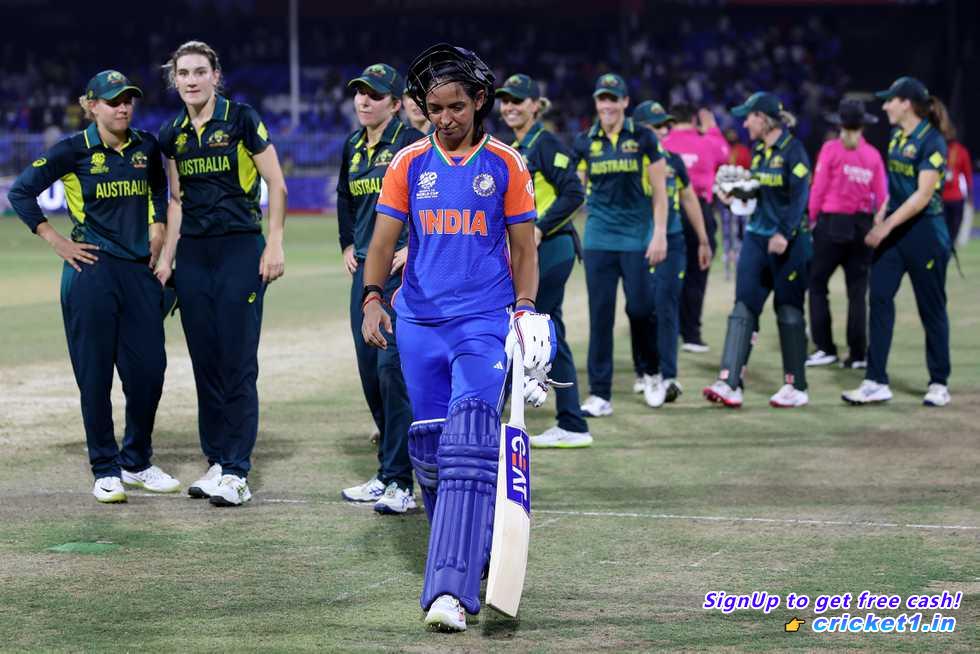
In the intense world of international cricket, where precision and consistency can define a game, Indian skipper Harmanpreet Kaur is not known for faltering in her fielding duties. However, under the floodlights of the Sharjah Cricket Ground, she fumbled a straightforward catch at extra cover off Tahlia McGrath’s bat. Her disappointment was palpable, marked by a quiet self-reproach as she looked down. The Indian captain immediately sprang into action, attempting to redeem herself with a courageous dive on the next ball, yet the ball frustratingly evaded her reach, granting Grace Harris a fortuitous escape. When McGrath charged and missed a delivery from left-arm spinner Radha Yadav, resulting in a stumping, Harmanpreet’s hug of relief conveyed an unspoken apology to Yadav.
The night was fraught with challenges for Harmanpreet. As India set off to chase a target of 152, a host of minor frustrations accumulated for the captain, creating a series of challenges. During the drinks break, as the stadium’s floodlights dimmed for an exuberant dance and light show, Harmanpreet sent for a change of bats, unsatisfied with the feel of the one she was using. From the two alternatives brought to her, she abandoned the one still enveloped in plastic and practiced with the other, seeking counsel from head coach Amol Muzumdar.
“The priority was the run chase and to keep our net run rate in consideration,” Muzumdar explained after the close nine-run defeat on a poignant Sunday. “I believed Harman’s stay at the crease was crucial right until the end, and indeed, we almost clinched the match.”
At a precarious point, India required 85 runs from the final 10 overs, trapped in the suffocating clutch of Australia’s middle-overs bowlers. India managed only a single boundary from over eight to fourteen, while Harmanpreet, although not in peak form, relied on the quick starts from Jemimah Rodrigues and Deepti Sharma to bring the equation down to 14 from the last six balls. Yet, frustrations mounted for her throughout the innings.
Incidents such as a slog-sweep she executed that seemed destined for a six barely fell short into the diving hands of Darcie Brown. A free hit was tantalizingly missed; no thanks to an overly vocal stand-in wicketkeeper Beth Mooney who constantly peppered Harmanpreet with comments from behind the stumps. In a flash, India collapsed from an energetic position to a downfall of 6 for 32, leaving them tantalizing close yet so far away from victory.
.
Although India (99 for 3) at the death overs mirrored Australia’s score of 101 for 5, the stumbling block was losing crucial wickets just when acceleration was attempted, which methodically dismantled the Indian lower order. The loss of Deepti Sharma, orchestrated by Sophie Molineux, the Player of the Match, who deftly forced an error resulting in the longest boundary being breached, proved significant. In the same over, Megan Schutt under pressure facilitated Richa Ghosh’s departure after an ambitious but non-existent run. Harmanpreet, visibly fatigued, watched helplessly as another World Cup dream slipped away.
The cautious start and peculiar decisions, such as the puzzling execution in the last over, were symptomatic issues from Harmanpreet, but her sheer determination was undeniable. Australia’s strategy was undisputedly robust, highlighted by their adaptability and preparedness for Harmanpreet’s renowned onslaughts.
“Harman controls run chases phenomenally well,” said Tahlia McGrath, Australia’s stand-in captain. “She’s consistently admirable, and her presence at the crease never lets us feel truly in control.”
Australia’s resolve to counter Harmanpreet was beyond question. Past encounters, such as the 2017 ODI World Cup or the Commonwealth Games final and the subsequent T20 World Cup semifinal, have reinforced this need for vigilance. Australia, ever-ready to contend with this formidable opponent, was efficient in minimizing her impact, which McGrath acknowledged as critical in maintaining control through the game.
Her courageous half-century, an unyielding exhibition of skill in strained conditions, ended with her at the non-striker’s end, powerless in the final over. Harmanpreet perhaps replayed the sequence of the dismissed opportunities off the first ball countless times, her regret tinging the expressionless post-match handshakes. On her retreat to the dugout, Harmanpreet glanced upwards to check on Australia’s Tayla Vlaemnick, nursing an injured shoulder which had abruptly closed her World Cup chapter, a pain Harmanpreet intimately understood given her recent struggles.
Head coach Muzumdar commented on the physical toll on his captain, “She’s dealing with persistent pain. She suffered a head injury early on, getting a knock just before the match against New Zealand. But she’s a fighter, a workhorse, continuing to lead by example.”

